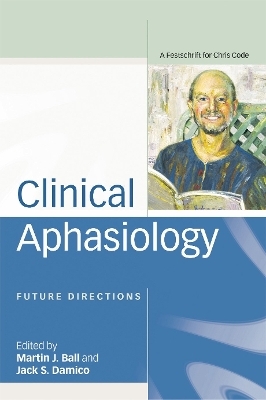
Clinical Aphasiology
Psychology Press Ltd (Verlag)
978-0-415-64888-2 (ISBN)
The remaining contents have been divided into three main approaches to the study of aphasia, reflecting Professor Code’s own interests. First are the contributions that fall under the heading of Conceptual Considerations. These are mainly interdisciplinary in nature, spanning linguistics, phonetics, psychology and neurology, as well as social aspects of communication disorders. The second section of the book deals with Research Considerations, with chapters ranging from how the study of disrupted communication can inform models of normal language processing, through tone production and processing in speakers with aphasia, to anomia and progressive multifocal leukoencephalopathy. Each of these chapters explores different aspects of research methodology, including quantitative and qualitative research. The final section of the collection deals with Clinical Considerations; the chapters here cover counselling, computerized training, cultural and linguistic diversity in aphasia, right hemisphere disorders, and communication problems in the dementias.
Clinical Aphasiology will be an invaluable tool for both students and practitioners in speech and language pathology, psychology, neurology, and related fields.
Martin J. Ball is Hawthorne-Board of Regents’ Support Fund Endowed Professor, Head of the Department of Communicative Disorders, and Director of the Doris B. Hawthorne Center for Special Education and Communication Disorders at the University of Louisiana at Lafayette. He is an Honorary Fellow of the Royal College of Speech and Language Therapists (London). Dr Ball has authored and edited twenty books, over 30 contributions to collections and over seventy refereed articles in academic journals. He is co-editor of the journal Clinical Linguistics and Phonetics. His main research interests include clinical phonetics and phonology, and the linguistics of Welsh. He is currently President of the International Clinical Phonetics and Linguistics Association. Jack S. Damico holds the Doris B. Hawthorne Eminent Scholar Professorship in Communicative Disorders at the University of Louisiana at Lafayette and is a Fellow of the American Speech-Language-Hearing Association. He has published over 80 articles and chapters in the areas of applied linguistics, clinical aphasiology and language pathology. His primary interests are in clinical aphasiology and the study of language as a synergistic phenomenon. He has authored, co-authored or edited eight professional books.
M. J. Ball, J. S. Damico, Preface. Chris Code’s Contribution to Aphasiology. Part I: Conceptual Considerations. M. Herrmann, T. Fehr, Investigations in Speech and Language and Related Disorders: Crossing the Boundaries between Disciplines—a tribute to Chris Code. H. W. Buckingham, S. S. Christman, Independent Evidence for the Unification of Explanatory Paradigms in the Neurosciences. S. McDonald, The Social and Neuropsychological Underpinnings of Communication Disorders after Severe Traumatic Brain Injury. L. L. LaPointe, K. L. Lenius, Social Validation of Recovery in Aphasia. J.S. Damico, M. J. Ball, N. N. Simmons-Mackie, N. Müller, Interactional Aphasia: Principles and Practices Oriented to Social Intervention. Part II: Research Considerations. J.-L. Nespoulous, J. Virbel, From the Study of Language Dysfunction and Handicap to a Better Understanding of Linguistic Processing in Normality. I. Moen, Production and Perception of Word Tones in Patients with Brain Damage. B.E. Murdoch, Subcortical Aphasia: Historical Perspective and Contemporary Thinking. T. Bormann, G. Blanken, C.-W. Wallesch, Mechanisms of Lexical Selection and the Anomias. N. Müller, A. Kozlowski, P. Doody, Repetitive Verbal Behaviours in PML: An Exploratory Study of Conversation. A. Ferguson, Multiparty Interactions in Aphasia. E. Armstrong, H. K.Ulatowska, Stroke Stories: Conveying Emotive Experiences in Aphasia. Part III: Clinical Considerations. A.L. Holland, Counseling Families and Adults with Speech and Language Disorders: The View from a Wellness Perspective. C. Penn, Cultural Dimensions of Aphasia: Adding Diversity and Flexibility to the Equation. S. Edwards, R. Bastiaanse, Assessment of Aphasia in a Multi-lingual World. R.C. Katz, R.T. Wertz, Computerized Aphasia Treatment Outcomes Research: The Past and a Proposal. L. Togher, Traumatic Brain Injury Rehabilitation: Advanced Communication Training Perspectives. Y. Joanette, M. Champagne-Lavau, K. Kahlaoui, B. Ska, The Future of our Knowledge about Communication Impairments Following a Right-hemisphere Lesion. M. Pachalska, Progressive Language and Speech Disorders in Dementia. Author Index. Subject Index.
| Erscheint lt. Verlag | 11.8.2015 |
|---|---|
| Zusatzinfo | 5 Tables, black and white |
| Verlagsort | Hove |
| Sprache | englisch |
| Maße | 156 x 234 mm |
| Gewicht | 544 g |
| Themenwelt | Geisteswissenschaften ► Psychologie ► Allgemeine Psychologie |
| Geisteswissenschaften ► Psychologie ► Biopsychologie / Neurowissenschaften | |
| Geisteswissenschaften ► Psychologie ► Klinische Psychologie | |
| Medizin / Pharmazie ► Gesundheitsfachberufe ► Logopädie | |
| ISBN-10 | 0-415-64888-2 / 0415648882 |
| ISBN-13 | 978-0-415-64888-2 / 9780415648882 |
| Zustand | Neuware |
| Haben Sie eine Frage zum Produkt? |
aus dem Bereich


